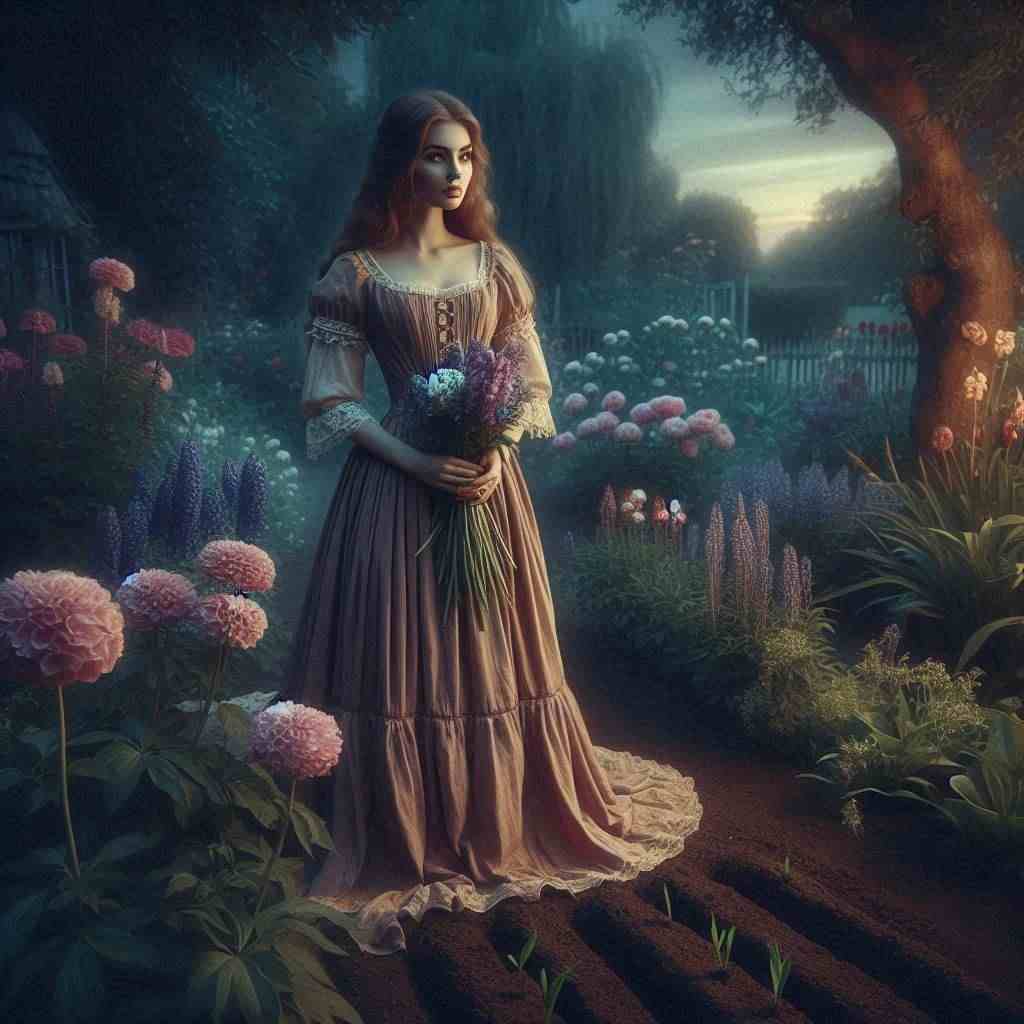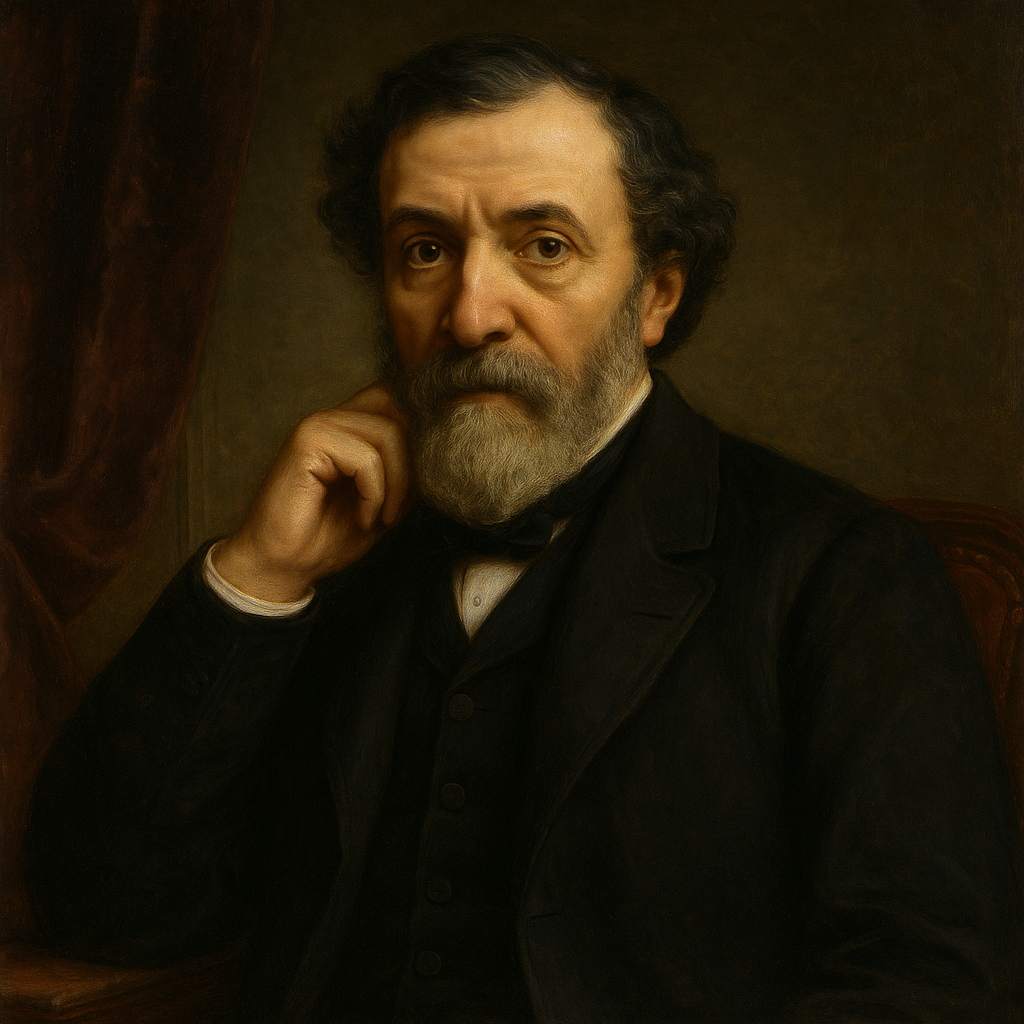You'll love Me yet
Robert Browning
1812 to 1889

You'll love me yet!—and I can tarry
Your love's protracted growing:
June rear'd that bunch of flowers you carry,
From seeds of April's sowing.
I plant a heartful now: some seed
At least is sure to strike,
And yield—what you'll not pluck indeed,
Not love, but, may be, like.
You'll look at least on love's remains,
A grave's one violet:
Your look?—that pays a thousand pains.
What 's death? You'll love me yet!
Robert Browning's You'll love Me yet
Introduction
Robert Browning's "You'll love Me yet" is a poignant exploration of unrequited love, hope, and the passage of time. This 12-line poem, with its deceptively simple structure, belies a complex emotional landscape that invites deep analysis. Through careful examination of its form, language, and thematic content, we can uncover the nuanced ways in which Browning crafts a narrative of patient anticipation and unwavering optimism in the face of romantic uncertainty.
Form and Structure
The poem consists of three quatrains, each following an ABAB rhyme scheme. This regular structure provides a sense of order and progression, mirroring the speaker's methodical approach to nurturing love. The alternating rhymes create a musical quality that enhances the poem's emotional resonance, while also suggesting the back-and-forth nature of romantic pursuit.
Browning's use of iambic tetrameter in the odd-numbered lines, contrasted with iambic trimeter in the even-numbered lines, creates a rhythmic pattern that echoes the ebb and flow of emotional intensity. This metrical variation serves to emphasize key words and phrases, particularly at the end of each line, drawing attention to the poem's central themes of growth, patience, and the passage of time.
Imagery and Symbolism
The poem is rich with horticultural imagery, employing an extended metaphor that compares love to the cultivation of plants. This metaphor is introduced in the third line with "June rear'd that bunch of flowers you carry," and is developed throughout the poem. The speaker positions himself as a gardener of sorts, "planting" emotions and tending to them over time.
The contrast between "April's sowing" and June's blossoming suggests a natural progression of love, implying that the speaker's affections, too, will eventually come to fruition. This temporal imagery is particularly poignant, as it underscores the patience required in matters of the heart.
The violet mentioned in the penultimate stanza serves as a powerful symbol. Associated with modesty and faithfulness in the Victorian language of flowers, the violet growing on a grave represents the enduring nature of love, even in the face of death. This image cleverly intertwines themes of mortality and eternal devotion, adding depth to the speaker's declaration of love.
Tone and Voice
The poem's tone is one of gentle persistence and optimism. The speaker's voice is characterized by a quiet confidence, evident in the repeated assertion "You'll love me yet!" This refrain, bookending the poem, creates a circular structure that reinforces the speaker's unwavering belief in the eventual reciprocation of his feelings.
Despite the potential for despair in unrequited love, the tone remains hopeful throughout. The speaker's willingness to "tarry" and wait for love to grow demonstrates a mature understanding of emotional development. This patience is further emphasized by the use of future tense verbs, suggesting a forward-looking perspective that anticipates positive outcomes.
Thematic Analysis
At its core, "You'll love Me yet" explores the theme of love's transformative power over time. The speaker posits that love, like a seed, requires nurturing and patience to flourish. This idea challenges the notion of love at first sight, instead presenting a more gradual and organic development of affection.
The poem also grapples with the concept of emotional investment in the face of uncertainty. The speaker's willingness to plant a "heartful" despite the risk of rejection speaks to the courage required in matters of love. This vulnerability is balanced by a sense of quiet determination, as evidenced by the assertion that "some seed / At least is sure to strike."
Furthermore, Browning examines the subtle distinctions between love and liking. The line "Not love, but, may be, like" acknowledges the spectrum of human emotion, suggesting that even a lesser degree of affection holds value. This nuanced approach to romantic feelings adds complexity to the poem's exploration of love.
The final stanza introduces the theme of mortality, juxtaposing death with the enduring nature of love. By questioning "What's death?" in the context of eventual love, the speaker implies that true affection transcends physical existence. This adds a metaphysical dimension to the poem, elevating the speaker's devotion to a nearly spiritual level.
Language and Diction
Browning's choice of language is deceptively simple, employing common words to convey complex emotions. The use of contractions like "You'll" and "What's" lends an informal, conversational tone to the poem, making the speaker's declarations feel more intimate and genuine.
The poet's diction is carefully chosen to reinforce the horticultural metaphor. Words like "rear'd," "seeds," "sowing," and "plant" create a consistent semantic field that underscores the organic nature of love's growth. This natural imagery is contrasted with more abstract concepts like death and emotional pain, creating a tension between the tangible and intangible aspects of love.
Browning's use of enjambment, particularly in the second stanza, creates a sense of continuity and flow that mirrors the gradual development of affection. This technique also serves to emphasize certain words and phrases, such as "some seed / At least is sure to strike," heightening their impact and significance within the poem.
Historical and Literary Context
"You'll love Me yet" reflects several key aspects of Victorian poetry and culture. The poem's emphasis on patience and moral fortitude aligns with Victorian values, while its exploration of unrequited love taps into a common theme in Romantic and post-Romantic literature.
Browning's approach to love poetry in this work differs from the more effusive style of some of his contemporaries. Instead of grand declarations or passionate outbursts, he presents a quieter, more contemplative view of love. This subtlety aligns with Browning's reputation as a master of the dramatic monologue, as the poem reveals the speaker's character through his patient and hopeful approach to love.
The poem's fusion of natural imagery with emotional states reflects the influence of Romanticism on Victorian poetry. However, Browning's more restrained treatment of these themes distinguishes him from earlier Romantic poets, showcasing a evolution in poetic sensibilities during the Victorian era.
Conclusion
"You'll love Me yet" stands as a testament to Robert Browning's poetic craftsmanship and his nuanced understanding of human emotion. Through its skillful use of form, imagery, and language, the poem creates a rich tapestry of meaning that invites multiple interpretations.
Browning's exploration of love's gradual growth, the interplay between hope and patience, and the enduring nature of affection resonates beyond its Victorian context, speaking to universal human experiences. The poem's subtle complexity, hidden beneath its seemingly simple surface, rewards careful analysis and continues to offer insights into the nature of love and the human heart.
In its gentle persistence and unwavering optimism, "You'll love Me yet" not only captures the essence of patient devotion but also serves as a reflection on the transformative power of time and the enduring hope that lies at the core of human relationships. As such, it remains a compelling subject for literary study, offering rich ground for interpretation and analysis in the field of English literature.
This text was generated by AI and is for reference only. Learn more
Want to join the discussion? Reopen or create a unique username to comment. No personal details required!



Comments
No comments yet. Be the first to comment!